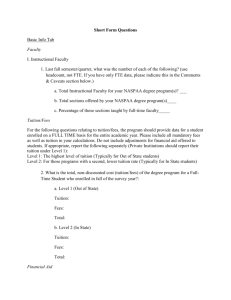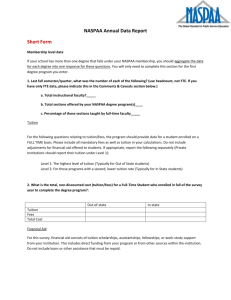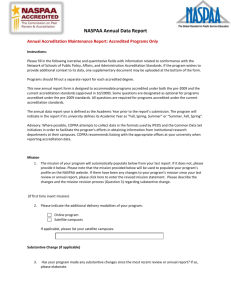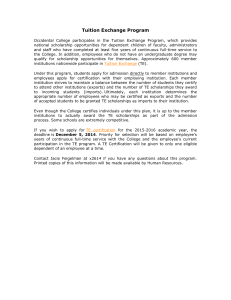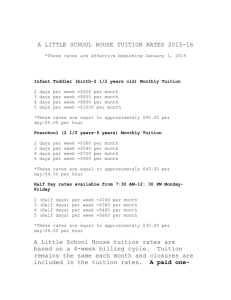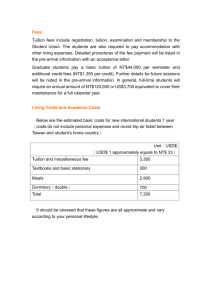Accreditation Maintenance Report (Annual Data
advertisement
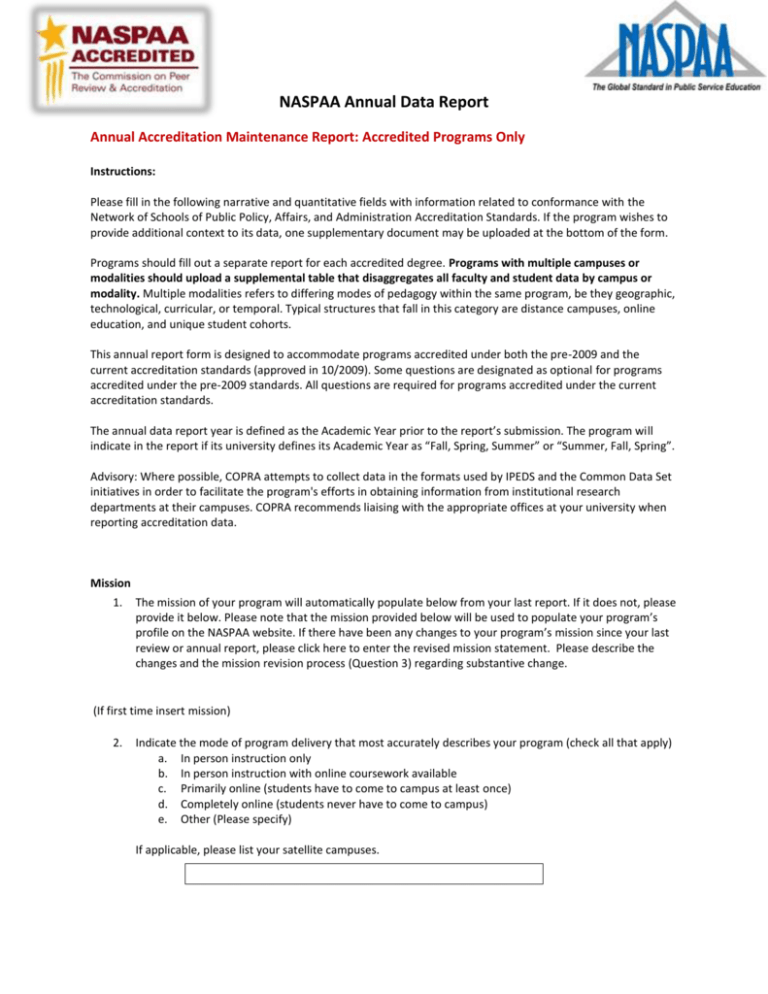
NASPAA Annual Data Report Annual Accreditation Maintenance Report: Accredited Programs Only Instructions: Please fill in the following narrative and quantitative fields with information related to conformance with the Network of Schools of Public Policy, Affairs, and Administration Accreditation Standards. If the program wishes to provide additional context to its data, one supplementary document may be uploaded at the bottom of the form. Programs should fill out a separate report for each accredited degree. Programs with multiple campuses or modalities should upload a supplemental table that disaggregates all faculty and student data by campus or modality. Multiple modalities refers to differing modes of pedagogy within the same program, be they geographic, technological, curricular, or temporal. Typical structures that fall in this category are distance campuses, online education, and unique student cohorts. This annual report form is designed to accommodate programs accredited under both the pre-2009 and the current accreditation standards (approved in 10/2009). Some questions are designated as optional for programs accredited under the pre-2009 standards. All questions are required for programs accredited under the current accreditation standards. The annual data report year is defined as the Academic Year prior to the report’s submission. The program will indicate in the report if its university defines its Academic Year as “Fall, Spring, Summer” or “Summer, Fall, Spring”. Advisory: Where possible, COPRA attempts to collect data in the formats used by IPEDS and the Common Data Set initiatives in order to facilitate the program's efforts in obtaining information from institutional research departments at their campuses. COPRA recommends liaising with the appropriate offices at your university when reporting accreditation data. Mission 1. The mission of your program will automatically populate below from your last report. If it does not, please provide it below. Please note that the mission provided below will be used to populate your program’s profile on the NASPAA website. If there have been any changes to your program’s mission since your last review or annual report, please click here to enter the revised mission statement. Please describe the changes and the mission revision process (Question 3) regarding substantive change. (If first time insert mission) 2. Indicate the mode of program delivery that most accurately describes your program (check all that apply) a. In person instruction only b. In person instruction with online coursework available c. Primarily online (students have to come to campus at least once) d. Completely online (students never have to come to campus) e. Other (Please specify) If applicable, please list your satellite campuses. Substantive Change (if applicable) 3. Has your program made any substantive changes since the most recent review or annual report? If so, please elaborate. [A substantive change is defined as a significant departure from the last accreditation review regarding a program's operation, including but not limited to: mission, goals, objectives, assessment practices, delivery modalities and locations, targeted student population, governance structures, and required and elective competencies.] Program Evaluation 4. Program Evaluation: Please discuss how the program has collected, applied, and reported information about its performance and its operations to guide the evolution of the program’s mission and the program’s design and continuous improvement in the past year. If you wish to upload any supplements, you may do so at the bottom of the form. Faculty Nucleus 5. How many members of your faculty do you consider to be part of the faculty nucleus? _____ Nucleus faculty information should be entered using the "Add/ View a Faculty Member" tab at the top of the page. You only have to enter information for at least 5 nucleus faculty members. If you have previously entered faculty information in a Self-Study Report or Annual Report within this system the information will be auto-populated in the tab. You should check to verify none of the information has changed and edit as necessary. Please provide the percentage of courses in each category that are taught by full and part-time faculty in the annual report year. Programs with multiple campuses or modalities should upload a supplemental table that breaks this information down by campus or modality. 6. Please provide the percentage of courses in each category that are taught by full and part-time faculty in the annual report year. Programs with multiple campuses or modalities should upload a supplemental table that breaks this information down by campus or modality. % Taught by Full Time Faculty % taught by Part Time Facultyi All Coursesii % % Courses delivering required competencies % % 7. Data Explanations: The following blank field is offered in case the program would like to provide any narrative context or explanation for any of the faculty data, including course coverage, in this form. If modality information is required, you may also use the box to provide additional breakdowns. (Optional for all programs) 8. Indicate how the program defines its Academic Year Calendar Summer, Fall, Spring Fall, Spring, Summer Other (please specify) Student Data 9. Admissions: Please fill out this table describing your program’s applicant pool for the annual report year. Combine applicants across the year into one pool. The number of enrolled students should only include those students who were admitted and enrolled within the annual report year. This number should not reflect total student enrollment. Programs with multiple campuses or modalities should upload a supplemental table that breaks this information down by campus or modality. Student Category Number of Students Applicants Admitted Students Enrolled Students 10. Graduation Rates: (This question is optional for programs using the pre-2009 standards.) Below, using the ARY-5 cohortiii, indicate the cohort’s initial enrollment numbers, how many of those enrolled graduated within the program design length, and within 150% and 200% of program design length. Note that the numbers in each successive column are cumulative, meaning that the number of students in the column for 200% of degree length should include the numbers of students from the 150% column, plus those that graduated within 150-200% of program length. For example, if 15 students initially enrolled, 10 graduated in 100%, 2 graduated in 150% and 1 graduated in 200% you would enter: 15; 10; 12; 13. NOT 15; 10; 2; 1. Programs with multiple campuses or modalities should upload a supplemental table that breaks this information down by campus or modality. Initially Enrolled Graduated in 100% of Degree Program Length Graduated in 150% of Degree Program Length Graduated in 200% of Degree Program Length Total Number of Students in the ARY-5 Cohort 11. Please define your program design length: (semesters/quarters/terms/other) (1/2/3/4/5/6/7/8/9/10) 12. Report the job placement statistics (number) for the year PRIOR TO the annual program survey year, of students who were employed in the “profession” within six months of graduation, by employment sector, using the table below. Programs with multiple campuses or modalities should upload a supplemental table that breaks this information down by campus or modality. National or central government in the same country as the program State, provincial or regional government in the same country as the program City, County, or other local government in the same country as the program Government (all levels) or international quasi-governmental Nonprofit domestic-oriented Nonprofit/NGOs internationally-oriented Private Sector - Research/Consulting Private Sector but not research/ consulting Obtaining further education Military Service Unemployed (not seeking employment) Unemployed (seeking employment) Status Unknown Total 13. CHEA requires NASPAA to ensure that programmatic outcomes are provided on all public communication materials. Please copy and paste an URL link to where your program website presents employment statistics (or other programmatic outcomes) to show student success. 14. Data Explanations: The following blank field is offered in case the program would like to provide any narrative context or explanation for any of the student data – enrollment information, graduation and employment rates, - in this form. If modality information is required, you may also use the box to provide additional breakdowns. (Optional for all programs) Resource Sufficiency (if applicable) 15. If there have been any significant changes in resource trends and the sufficiency of resources available to the program to pursue its mission, objectives, and continuous improvement. (If there are no changes, the program may leave this field blank.) Standards Being Monitored (if applicable) 16. If your program is being monitored on a specific Standard, you are required to provide updated information on the issue raised by COPRA in your decision letter each year until which you are notified that COPRA has removed the monitoring. Please refer to your most recent decision letter, available in the Documents tab, to review COPRA’s request for ongoing information. Your program is being monitored on the following standards: Standard X.O Student Support (Populated automatically from the program accreditation status): Standard X.Y etc. (Populated automatically from the program accreditation status): Standard X.Z etc. (Populated automatically from the program accreditation status): Exhibits (Optional) Upload any relevant exhibits or explanatory supplements here. You may upload as many supplements as necessary. However, you can only upload one file. You should combine multiple documents into one pdf for upload. (Optional for all programs) Annual Program Survey: All NASPAA Members Short Form Membership level data If your school has more than one degree that falls under your NASPAA membership, you should aggregate the data for each degree into one response for these questions. You will only need to complete this section for your first degree program. Last fall semester/quarter, what was the number of each of the following? (use headcount, not FTE. If you have only FTE data, please indicate this in the Comments & Caveats section below.) a. Total instructional faculty?_____ b. Total sections offered by your NASPAA degree program(s)____ c. Percentage of those sections taught by full-time faculty_____ Tuition For the following questions relating to tuition/fees, the program should provide data for a student enrolled on a FULL TIME basis. Please include all mandatory fees as well as tuition in your calculations. Do not include adjustments for financial aid offered to students. If appropriate, report the following separately (Private Institutions should report their tuition under Level 1): Level 1: The highest level of tuition (Typically for Out of State students) Level 2: For those programs with a second, lower tuition rate (Typically for In State students) What is the total, non-discounted cost (tuition/fees) for a Full-Time Student who enrolled in fall of the survey year to complete the degree program?: Out-of-state In-state Tuition Fees Total Cost Financial Aid For this survey, financial aid consists of tuition scholarships, assistantships, fellowships, or work-study support from your institution. This includes direct funding from your program or from other sources within the institution. Do not include loans or other assistance that must be repaid. Indicate the percentage of students enrolled in the program who received financial aid. Enter separate percentages for Full-time, Part-Time, and International Students. Enter a whole number between 0 and 100 for 0% to 100%. % of Full-Time Students receiving financial aid % of Part-Time Students receiving financial aid % of International Students (Full and Part-Time) receiving financial aid Program Level Data The following section should be completed for each of your NASPAA membership degrees. Name of the School/ Department where the program resides Indicate who the program is primarily designed to serve (select only one): a. Full-time students only b. Generally full-time with some part-time c. Both full-time and part-time students d. Generally part-time with some full-time e. Part Time Students only f. Other (please explain) Are evening or weekend classes available We have evening classes but not weekend ones We have weekend but not evening classes We have both evenings and weekend ones We have neither evening nor weekend classes Approximately how many semesters/ terms would it take a full-time student to complete the program? 5 Semesters 4 Semesters 3 Semesters 2 Semesters 7 terms 6 terms 5 terms 4 terms Not Applicable - Program has no Full Time Students Other (please specify) Indicate the mode of program delivery that most accurately describes your program (check all that apply) a. In person instruction only b. In person instruction with online coursework available c. Primarily online (students have to come to campus at least once) d. Completely online (students never have to come to campus) e. Other (Please specify) In the area below, describe what is distinctive about this degree program that you would like prospective students to know. You may not refer to your programs US News and World Report rankings in this text box. (Limit 60 words) Please select the concentrations/specializations your program offers (Check all that apply): None Budgeting/ Finance City/ Local Criminal Justice Economic Development Education Emergency Environment General/ Public Management Health Homeland/ National Security Human Resources Information Technology International/ Global Leadership Nonprofit Organizational Management Public Policy Analysis Public Sector Social Policy State Survey Methods Urban Other (Please specify) If your program has a branch or satellite campus located in another state or country, please check off which location(s) your program is available. Admission Requirements (check all that apply): Bachelors Degree Required Optional N/A Letter of Recommendation Required Optional N/A Required Optional N/A Required Optional N/A Required Optional N/A Optional N/A Resume Standardized Tests GPA Statement of Intent Required Essay/Additional Writing Sample Required Optional N/A Optional N/A Optional N/A Professional Experience Required Interview Required Special Mission Based Criteria Required Optional N/A Other Required Optional N/A Please provide a short (300 characters) description of your programs admissions policy. (In this area you may talk about waivers, typical admits, and mission based admissions factors). What is the total number of new students entering the program in the fall? What is the total number of students currently enrolled in the program? Total completed applications received in the academic year for only this program (combining summer, fall and spring admission cycles if necessary, and combining applications for full-time and part-time enrollment). Count only those applications that are considered "complete" for admission: Enter whole numbers of applications only. Of the total number of students currently enrolled, what is the percentage of a. Out-of-state students: % b. International students: % c. Female students: % d. Part-time students: % e. Persons of diversity (Please do not include international students in this category) % How many degrees were awarded by this degree program during data report year Long Form Membership Level Data If your school has more than one degree that falls under your NASPAA membership, you should aggregate the data for each degree into one response for these questions. You will only need to complete this section for your first degree program. What is the median salary for the following (if you have 3 or fewer total faculty use d. to enter median salary): a. Professor: b. Associate Professor: c. Assistant Professor: Please enter the staff FTE (Full-Time Equivalent) devoted to those functions (even if some staff perform multiple functions). Use 0 [zero] for functions without designated staff. 1. Recruiting: 2. Admissions: 3. Student Advising: 4. Career Services: 5. Alumni: 6. Distance Learning Administrative Support: Health Insurance Fees: Do the mandatory fees included in the calculations of cost in non-discounted cost (tuition/fees) of the degree program, include health insurance? Yes No Were students accepted into the program offered Graduate/Teaching Assistantships this academic year? Yes No If your program offers a stipend for your graduate or teaching assistants, what is the average stipend offered? Below $5,000 $5,000-$10,000 $10,001-$15,000 $15,001-$20,000 $20,001 and above Do you offer any tuition waivers or scholarships not tied to Graduate/Teaching Assistantships? Yes No Does the program: include tuition in financial aid offer a tuition waiver both neither If your program offers a tuition waiver, what is the maximum number of years a student can receive a tuition waiver? years Program Level Data The following section should be completed for each of your NASPAA membership degrees. Your institution is: A NASPAA Member An APPAM Member A member of both NASPAA and APPAM Indicate the location of the degree program within the University: a. In a Stand Alone School b. In a Center or Institute c. In a Department of Political Science d. In a Department other than Political Science e. In a Business School f. Other (Please explain) Is a Dual-degree option available to students? Yes No What is the institution's academic calendar? Semester Quarter Other (Please specify) Indicate the credit hour allocations for the following (use hours not percentages): a. Required Courses: c. Required Internship: b. Elective Courses: d. Other: What is the primary language(s) of instruction used for this degree program English Only English and other language(s) English is not a primary language If other, explain Do you accept new students year round or just in the Fall each academic year? a. We admit new students once a year, in the Fall only. b. We admit new students both in the Fall and Spring semesters. c. Other (Please specify) Of the total completed applications received in the academic year for this program, how many were accepted/admitted? Of the total admitted, what is the percent for: a. Out-of-state residents: % b. International students: % c. Female: % d. Persons of Diversity(do not provide these data if your University, State, or Country legally precludes you from doing so) % Of this number (total degrees awarded from Short form), how many were joint degrees? What is the data source for your alumni data? (Check all that apply.) Program Alumni Survey University Alumni Office School/Department Alumni Survey University Development Office We don't collect alumni data Other (Please specify) If most of your alumni data were collected from surveys, what was your survey sample collection criteria? Please use the space below to comment on data provided above: i Part Time Instructional Faculty: Adjuncts and other instructors being paid solely for part-time classroom instruction. Also includes full-time faculty teaching less than two semesters, three quarters, two trimesters, or two four-month sessions. Employees who are not considered full time instruction faculty but who teach one or more non-clinical credit courses may be counted as part-time faculty. ii “All Courses” includes all courses delivering required competencies for students in the program, as well as all required courses for elective specializations. It does not include courses outside of these categories that are not primarily for students of the program, and does not include elective options in other departments, unless they are regular substitutes for required courses. iii ARY-5 cohort is the group of students who entered the program in the academic year that began 5 years before the annual report year. Programs unable to use this cohort as a basis for calculating completion rates should explain their approach for calculating a completion rate in the optional text box.
